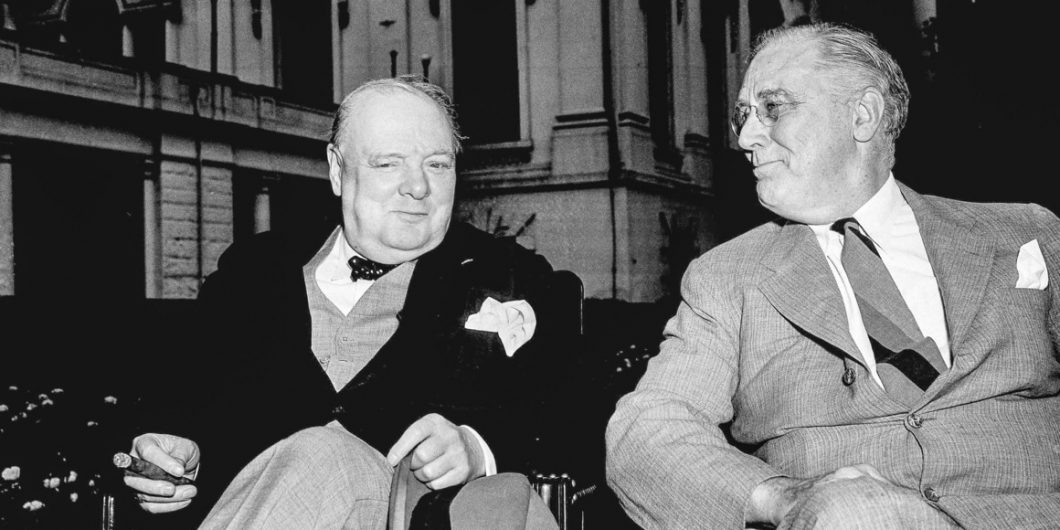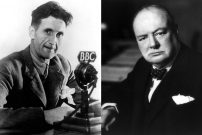The Friendships of Winston Churchill
If you love somebody long enough or passionately enough, you recognize that they are imperfect. As a friend, you are then faced with a choice: 1) diminish the friendship because of this imperfection; or 2) accept that people are flawed and do your best to love them anyway.
So it is with John von Heyking’s brilliant but frustrating Comprehensive Judgement and Absolute Selflessness: Winston Churchill on Politics as Friendship. In short, this book is a welcome philosophical overview of Winston Churchill as a friend. By examining Churchill’s words and actions, von Heyking makes a convincing case that to truly appreciate him, one must understand that he was a passionate and dedicated friend. Von Heyking argues effectively that Churchill’s friendships were genuine, long-lasting, and frequently crossed party lines. To this end, this book succeeds in saying something truly novel about a man who (according to a search of WorldCat) has been the subject of over 44,000 published works!
Because of his stature as a statesman, warrior, and author, it is easy to forget that Churchill had well-formed views about many philosophical issues, including friendship. He truly believed that friendship and compassion were essential ingredients for a successful democracy. As such, it is impossible to separate Churchill’s greatness from his goodness. Indeed, as a friend and a politician, he was magnanimous and trusting almost to a fault. As a political philosopher with a nuanced view about the challenges of democracy, human nature, and justice, Churchill still has important lessons for our own troubled, politically polarized times. For these very important reasons, von Heyking’s book deserves broader exposure and serious intellectual engagement.
Despite its significant virtues, the book’s greatest weakness is that it provides an oversimplified view of a very complex man. Von Heyking bases his discussion of friendship around a dichotomy that presents a choice between an Aristotelian view of virtuous friendship which is pure and just and a Machiavellian view which is strictly transactional. The book then proceeds to use Churchill as a test case for these competing views and argues that he was an exemplar of Aristotelian virtue.
While this construct is a creative and enjoyable way in which to think about Churchill, it is drastically oversimplified. Indeed, while von Heyking is correct to claim that Churchill often picked his friends based simply on the fact that he enjoyed their company, he seems to ignore the fact that he could be very Machiavellian regarding his friendships when it suited him. Indeed, numerous examples exist of Churchill explicitly choosing friends because of their power, wealth, or influence (e.g. Aristotle Onassis, William Randolph Hearst, Charlie Chaplin, and Henry Strakosch). He would even admit to this uncomfortable truth in his more candid moments. Churchill was a good friend, but he was not unaware that certain people were better able to advance his political career, provide much needed financial assistance, or simply indulge him with luxurious comforts that he himself could not afford.
Von Heyking’s most detailed example of Churchill being Aristotelian, rather than Machiavellian, centers around his relationship with Franklin Roosevelt. While Churchill and Roosevelt became friends over the course of World War II, it is incorrect to suggest that there was not a deeply instrumental purpose underlying this bonhomie. Indeed, Churchill purposely cultivated the relationship with Roosevelt because he believed that an Anglo-American alliance was vital for the survival of Great Britain. In his memoirs, public comments, and more intimate moments, he was very consistent, even proud, to make this point. He stage-managed the meeting at Placentia Bay and subsequent summits to flatter Roosevelt, he bragged that he would defeat Germany by bringing America into the war, and he privately celebrated the Japanese attack on Pearl Harbor―hardly pure motives in the Aristotelian mold! While Churchill clearly trusted Roosevelt more than Stalin or other world leaders, von Heyking’s view of this friendship ignores the more interesting fact that this was a friendship forged largely out of geopolitical necessity, the very Machiavellian realpolitik that he claims Churchill eschewed.
To this end, von Heyking’s book is something of a missed opportunity to examine Churchill’s complex and often contradictory relationships. Rather than try to force these friendships into the construct of Aristotelianism versus Machiavellianism, it would have been more revealing to discuss relationships that were neither wholly good nor bad or friendships that evolved with the changing circumstances.
By perpetuating a view of Churchill as entirely magnanimous, von Heyking misses one of the most important insights about the man―Churchill had extreme passions and frequently took uncompromising maximalist positions.
Take, for example, Churchill’s relationship with Admiral John “Jackie” Fisher. He truly adored the venerable admiral, but their relationship was melodramatic in the extreme. As a young member of Parliament, Churchill was dazzled with his ideas on naval modernization. Then, as a junior cabinet member, Churchill came into conflict with Fisher because of disagreements over funding the construction of new warships. When Churchill became First Lord of the Admiralty, he traveled out of his way to consult with the then retired Admiral in order to cultivate his friendship and solicit his advice on naval matters.
After the outbreak of World War I, Churchill recalled Fisher to duty and made him the First Sea Lord, but despite their mutual respect, the two quickly discovered that they could not tolerate working with each other. Fisher resigned out of frustration, citing his exasperation with Churchill, an act that resulted in the collapse of the Asquith government. Desperate to save his job, Churchill quickly began a whisper campaign designed to insinuate that Fisher was mad. After losing his own position, Churchill alternated between friendship and scapegoating Fisher when it suited his purposes. After patching up their friendship yet again, Churchill shocked the nation by demanding that Fisher be returned to office. Churchill then was very dismissive of Fisher when defending himself before the Dardanelles Commission but would later try to make amends to his old friend. At Fisher’s death in 1920, Churchill appeared genuinely saddened and would frequently recall the old admiral’s memory for decades to come.
Churchill’s relationship with Fisher may have been one of his most tumultuous and histrionic, but it was hardly unique. In presenting Churchill as such a consistently noble figure, von Heyking’s book verges on hagiography. As such, von Heyking presents Churchill as a great man who always met challenges with nearly perfect kindness and compassion. This is unfortunate, as it ignores Churchill’s flaws and perpetuates a false understanding of his character.
In fact, Churchill was frequently vain, shallow, insecure, peevish, petty, priggish, presumptuous, and self-centered―he was human! Despite these all too human traits, Churchill did make friends easily, even converting many who had heard of his reputation as an arrogant boaster or who had significant political differences. As his one-time love interest, Pamela Plowden, said “the first time you meet him you see all his faults,” but “the rest of your life you spend in discovering his virtues.” This view of Churchill is truer to the real man and is potentially much more fertile ground for exploring his true character.
By perpetuating a view of Churchill as entirely magnanimous, von Heyking misses one of the most important insights about the man―Churchill had extreme passions and frequently took uncompromising maximalist positions. Because he vigorously pursued these passions, he simultaneously made enduring friendships and provoked severe animosity and mistrust. Even within von Heyking’s own framework, these extreme passions meant that Churchill was neither purely good (Aristotelian) nor purely wicked (Machiavellian). To ignore this passion and the fury that it sometimes caused is to accept a view of Churchill and his friendships that is far too limited and one that he himself would have likely rejected.
The extreme version of von Heyking’s thesis is his claim that Churchill was so consistently good that he, “probably also would have agreed with Socrates that it is unjust to harm one’s enemy, even if it is Hitler.” This is almost laughable as Churchill made it clear that he wanted nothing more than “victory at all costs” over Hitler and the Nazis. He personalized the war and made the erasure of the Nazis an explicit war aim demanding, “that every trace of Hitler’s footsteps, every stain of his infected, corroding fingers will be sponged and purged and, if need be, blasted from the surface of the earth.” Moreover, to defeat radical evil, Churchill was willing to be Machiavellian as he once quipped, “If Hitler invaded hell I would make at least a favourable reference to the devil in the House of Commons.” While von Heyking is correct that Churchill did not wish evil for evil’s sake and was extremely compassionate to the German people after the war, it is important to recognize the critical truth that he fought as he lived, with extreme passion.
As a reviewer, it is best to never fall in love with the books you pass judgment upon, lest passion cloud your vision. However, I strayed from this best practice and found that I was legitimately surprised by the powerful reactions, both good and bad, that this book elicited. I did find much to love about this book, but in the heat of passion, I also found significant reason for disagreement.
Ultimately, when faced with the choice that I began the review with, I will choose to love this book despite its flaws. Understood in this way, this book is as deeply imperfect and endearing as my hero, Winston Churchill.


